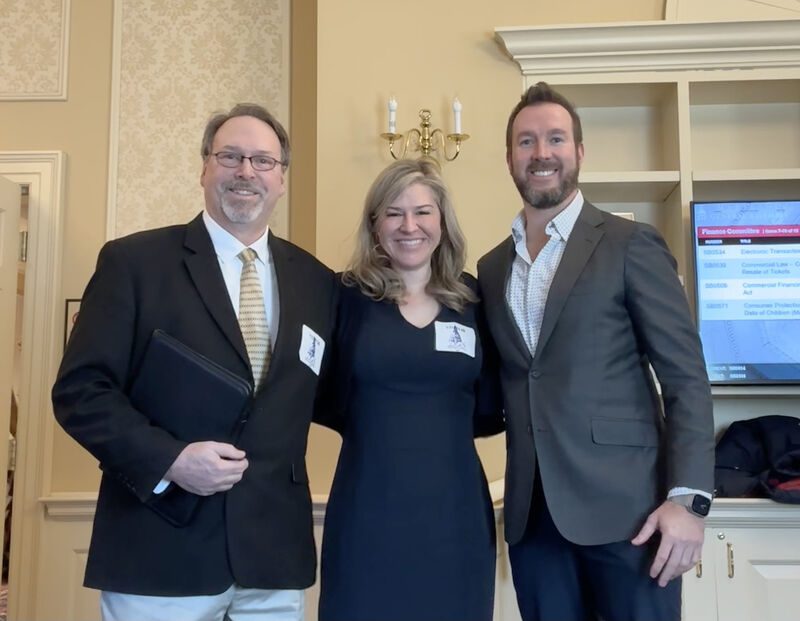
From left to right: Robert Storey, Deborah Hemingway PhD, and Howard Carolan testifying in Annapolis in support of HB 744/ SB 702.
Securing Maryland’s Biotech Future: Enhancing the Innovation Ecosystem through Legislative Reform
By Deborah Hemingway, PhD | March 1, 2024
| BioBuzz has been connecting the life science workforce since 2009. We’ve built an expansive community in the Mid-Atlantic with a national readership that spans from Massachusettes to Florida, and New York to California. For our next chapter, we’re building a proprietary talent logistics model to help employers source and hire life science talent. Learn more. |
In the heart of Maryland’s innovation ecosystem, the State of Maryland’s Biotechnology Investment Incentive Tax Credit Program (BIITC) stands as a testament to the state’s commitment to fostering economic growth, attracting investment capital, and nurturing early-stage companies. The program, which incentivizes investment into Maryland-based biotech companies through a refundable tax credit, has proven to be a formidable asset to our state.
However, despite its notable programming and widespread popularity, there is one issue with the BIITC that threatens its continued relevance, and that is the stipulation that in pass-through entities, the entity itself cannot claim the tax credit directly.
Due to this requirement, firstly, investors are left to navigate the opaque system by themselves and often have trouble successfully claiming the credit, leaving investors frustrated and unlikely to continue making investments, and, secondly, institutional investors that are otherwise willing and able to write big checks avoid the program in its entirety and deprive Maryland’s ecosystem of a critical source of capital.
Fortunately, there is proposed legislation in both chambers of the Maryland legislature–House Bill 744 and Senate Bill 702–that aims to solve this discrepancy by allowing pass-through entities, such as those run by my emerging venture firm Ecphora Capital, to collect the tax credit at the entity level. This is a move that promises to streamline investment processes, enhance operational efficiency, and solidify Maryland’s position as a leader in innovation. The legislation aligns the BIITC program with venture capital industry standards and norms, improves investor satisfaction and retention, and optimizes the efficacy of venture capital firms such as Ecphora Capital.
Access to venture capital is the lifeblood of startup companies, particularly in high-tech medical and biotech sectors. For Maryland to compete on a national and global stage, with established biotech hubs like Boston and San Francisco, aligning with the operational norms of the venture capital industry is not optional; it’s imperative. This alignment is crucial for attracting investment and supporting the operational dynamics of managing investments and distributions. By adopting this approach, Maryland not only facilitates ease of investment but also signals its understanding of and respect for industry standards, making it a more attractive destination for venture capital.
Additionally, the importance of investor satisfaction cannot be overstated. Investors are more likely to reinvest and contribute more capital when their initial experiences are positive. The current system, with its complexity and inefficiency, deters investment and complicates the relationship between investors and early-stage ventures. By facilitating distributions at the entity level, Maryland can significantly enhance investor satisfaction. This simplification of the investment experience removes barriers, making it easier for investors to support innovative companies. Satisfied investors are repeat investors, and their continued support–and continued investment–is vital for the growth of Maryland’s entrepreneurial ecosystem.
For venture capitalists, satisfaction of investors is paramount to operating a sustaining venture firm. The efficacy and ultimately success of the BIITC program is directly linked to the positive experiences of its participants. As venture capitalists seek to build sustainable, successful firms, the streamlined process proposed by HB 744/SB 702 is more than a preference, it is a necessity to lay a foundation for an enduring venture firm.
In conclusion, this bill represents more than just a simple administrative adjustment. It is a strategic enhancement of a program that has demonstrated significant potential and impact across the state, but that needs a next chapter if it is going to achieve its full potential. This is how laws either fade from relevance or rise to the occasion, through the willingness of lawmakers to understand shortcomings, discovered only in practice and execution, and to solve for them.
The passage of HB 744/SB 702 is a critical step toward ensuring that Maryland remains at the forefront of innovation and economic development and continues its rise as an emerging biotech innovation hub. As such, we believe it deserves the robust support of lawmakers, investors, and the broader community. Together, we can secure a prosperous future for Maryland, reinforcing its status as a beacon of innovation and a hub for venture capital investment.
- About the Author
- Latest Posts
BioBuzz is a community led, experience focused, biotech and life sciences media and events company. BioBuzz highlights regional breaking news, industry professionals, jobs, events, and resources for business and career growth. Their weekly newsletter is subscribed to by thousands in the BioHealth Capital Region and Greater Philadelphia as the go-to for industry updates.







